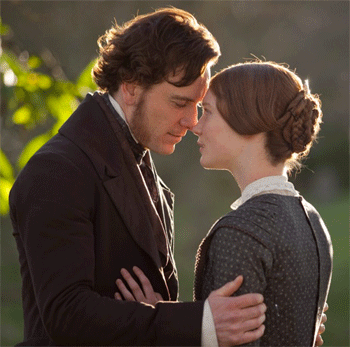It is always risky to watch a film version of a loved book. We worry that anyone adapting our favourite story for film will at best be “unfaithful” to the text, at worst they will “butcher” it. And so it was with no small amount of trepidation that I went to see the latest movie version of one of my favourite books, Charlotte Bronte’s Jane Eyre.
This most recent version is directed by Cary Fukunaga and stars Michael Fassbender as Mr Rochester and Australian actress Mia Wasikowska as Jane.
The film is lovely. Wasikowska is wonderful as Jane. She was 19 when the film was shot, making her the same age as the character and she manages to convey the poise, intelligence and deep, plain goodness that makes the character so appealing. Fassbender is decidedly too good-looking to be the brooding, “deep-browed” Rochester, but he captures the troubled gruffness well. Together they are a compelling pair. The scene after the aborted marriage, in which Mr Rochester begs Jane to stay with him is perfectly balanced in its furious passion (Rochester’s), struggle to do what is good over what is appealing (Jane’s) and emotion (both of theirs).

As an adaptation, Fukunaga’s version focuses on issues of class, the idea of freedom and the proto-feminist ideas of the novel. These themes are all integral to the novel and explored well in the movie. What Fukunaga leaves out, almost entirely, is Jane’s Christian faith.
Bronte’s novel is deeply Christian, and Bronte’s Jane is profoundly religious. Fukunaga’s film is contextually Christian and his Jane is relegated to a Christian merely by virtue of being born in the 19th century. This is not to say that Christianity is absent from the film – all the negatives associated with Christianity are still present, such as Brocklehurst’s fire and brimstone speech to a terrified ten-year old Jane, and the unattractive zeal of St. John Rivers (played by Jamie Bell of Billy Elliot fame). What is missing is the novel’s counterbalancing positive portrayals of Christianity, or the notion that faith can be experienced by any of the likeable characters.
There is no sense in the film of religious feeling in the character of Jane, or of Rochester. Their conversations about God are absent, as is Rochester’s belief (often expressed in the book) that he defies God’s command, not merely human convention, as he plans to commit bigamy by marrying Jane. In the book, Jane’s belief that she is Rochester’s equal comes from her understanding that she and Rochester are equal in the eyes of God. She leaves Rochester, partly to preserve her independence, but also because she is resolved to “keep the law given by God.” Jane makes decisions by the remarkable process of prayer and seeking to know “God’s will.”
Jane’s faith is by no means culturally imputed or peripheral to her character. We see this in her extraordinary affirmation of faith despite the despair she feels at leaving Rochester. Looking up at the night sky from the heath she declares: “I felt the might and strength of God. Sure was I of His efficiency to save what He had made… I turned my prayer to thanksgiving: the Source of Life was also the Saviour of spirits. Mr. Rochester was God’s, and by God would he be guarded.”
I could go on.
So, why is Jane’s faith left on the cutting room floor? The obvious answer is that such editorial decisions are a consequence of the secularism of our age. That is, that Jane’s Christianity got the chop because the filmmakers considered faith awkward or irrelevant for a modern audience. I suspect that religion, for today’s filmmakers, is part of a period drama’s furniture; for them the nineteenth century equals bonnets, carriages, manor houses and Christianity. There is certainly the sense in this version of Jane Eyre that Christianity is part of the decor of the story, rather than integral to it.
But, relegating religion in Jane Eyre to nothing more than context means you crash into one rather significant obstacle – Jane is a Christian. Not a bored church-goer, not someone who parrots Christian ideas out of obligation to the 19th century, but a full-blown, praying, believing Christian. And this is hard to get around—no matter what theoretical reading you apply to the text.
As such, the removal of faith that Jane’s character underwent as she made the transition from page to Fukunaga’s screen, should give us reason to pause. Christianity is simply too important to the novel as a whole, and to Jane herself, to ignore. Without it, Jane’s motivations make little sense. In a film like Fukunaga’s which portrays Jane without this faith, she cannot have the same character; to put it bluntly, she cannot be fully Jane.
This most recent version of Jane Eyre is thoroughly enjoyable. But, there have been 18 film and nine television versions of the novel, and I imagine that after a time Fukunaga’s film will join its confederates on the shelf. However, I have no doubt that Bronte’s novel will go on being read, loved and adapted for whatever medium is the most popular means of story-telling of the time. And surely the book’s long life and classic status spring, at least in part, from its rich, complex sense of the spiritual.
Kate Wilcox is studying Arts/Media Communications at Sydney University and is an intern at the Centre for Public Christianity


